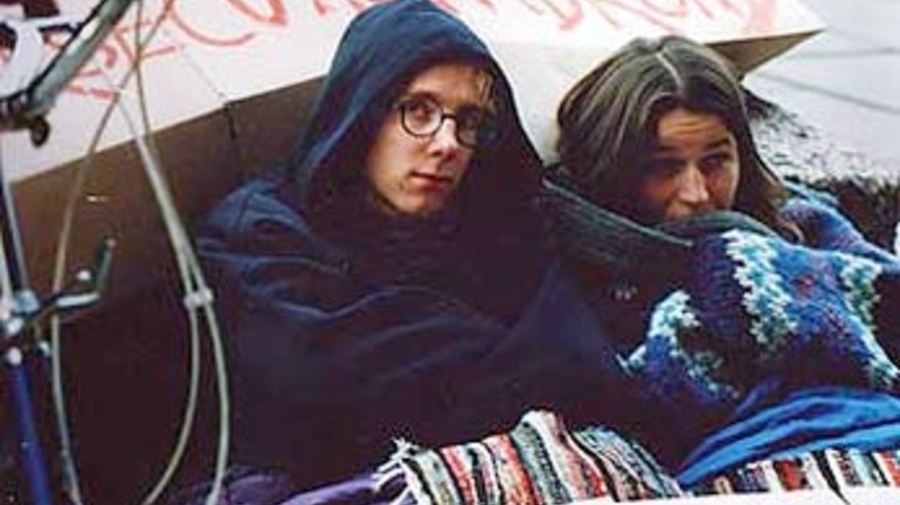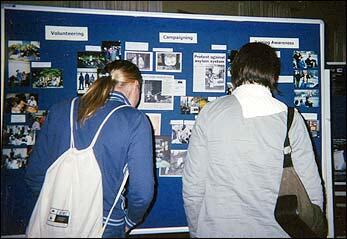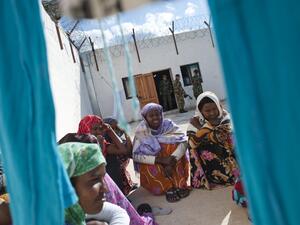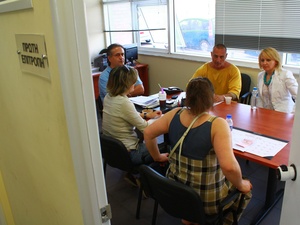Young refugee advocates get STAR treatment in the UK
Young refugee advocates get STAR treatment in the UK

Students from STAR Edinburgh sleep out to protest measures to reduce asylum support. Students at other UK universities have since followed this example, sleeping out to raise awarenesss and funds.
LONDON (UNHCR) - A group of students in the United Kingdom have a thing or two to teach the European Union about handling asylum issues.
Student Action for Refugees (STAR), a network of young people in the UK, recently held two events to share ideas and expertise from the region on the protection of people uprooted by conflict around the world.
"Respect Refugees: Time to Change the Labels" was the slogan of the first STAR national youth conference held in Birmingham on December 13. The event marked the first anniversary of STAR's youth network for 16- to 18-year-olds - one of the developed world's first youth movements organised around asylum that aims to raise awareness and take action for the rights of refugees and asylum seekers.
At the conference, teenage Britons, refugees and asylum seekers got to question British Members of Parliament Evan Harris and Lynne Jones on asylum issues and to participate in workshops on a range of topics from the rights of gay and lesbian refugees to the use of art to raise awareness. There were also exhibitions, including a lorry display entitled "Escape to Safety" that portrayed the journeys of three asylum seekers.
"STAR is a valuable partner to UNHCR in the UK," said Anne Dawson-Shepherd, who heads the refugee agency's office in London. "Thanks to STAR, we are able to raise awareness among the national student body about international refugee issues and our work. STAR provides a unique opportunity for UNHCR to develop a well-informed and enthusiastic support base among young people nationwide. We also benefit from the proceeds of many of STAR's innovative and thought-provoking fundraising events."
The national youth conference was one of STAR's latest initiatives and built on the success of its student groups, which are now present in over 30 universities across the UK.
STAR's outreach programme has also drawn interest from outside the country. It recently invited a group of Polish law students to its sixth annual student conference in Newcastle. The Poles' one-week study tour, supported by UNHCR, also allowed them to visit several local projects and help out at STAR's English conversation class for refugees. The exchange programme opened the eyes of both the guests and their British hosts to the challenges faced by refugee advocates grappling with two different realities.
The Polish students were surprised by the anti-immigrant sentiment in the British media. "If someone in Poland tried to persecute a refugee, the media would strongly criticise that," said law student Sylwia Kolarz. "My STAR colleagues could not believe that in Poland, words like 'immigration policy' or 'asylum seeker' don't make the headlines."
Part of the reason asylum is not a hot potato in Poland is that there are relatively few asylum seekers in the country. Also, the Poles are more receptive towards refugees because in the 1960s and 1980s, they were themselves forced to seek refuge in other countries.
The British students were amazed that Polish law students could give legal aid to asylum seekers, whereas only professional lawyers could offer such advice in the UK.
In Poland, a network of legal clinics has given law students the chance to put their knowledge into practice while assisting people who cannot afford professional help. The idea has expanded to a dozen other European countries. In contrast, British students usually play more supportive roles, giving language lessons to refugees or organising educational campaigns.
Still, the Polish guests were very impressed with their British hosts' activism outside the classroom, including STAR's latest campaign that asks the government to reconsider its decision to deny minimum support to asylum seekers who do not make immediate claims once they reach the UK.
"We were shocked by the fact that people can literally wait for asylum decisions on the street. But I really liked the concept of sending cards to MPs, calling for legal changes to benefit refugees," said Kolarz. "I was also surprised that STAR has so many prominent partners [like refugee agencies and MPs], that it is such a serious organisation that really makes an impact."
Another Polish student, Ola Kacperska, noted, "In fact, students' activities in Britain and Poland are completely opposite. That's why it's interesting to share experiences."
As Britain changes its laws and Poland accedes to the EU, the conditions for refugees and asylum seekers in both countries may become more similar. Hence the need to exchange views and experiences. The latest British plan to limit asylum seekers' access to legal aid may create a need for supplementary assistance that British students could offer. Likewise, Poland could learn from British non-governmental organisations how to cope with negative public opinion and hostile media should sentiments deteriorate.
Poland is already experiencing growing interest in refugee and migrant issues, which are becoming popular topics of debate at student conferences and meetings. In a number of Polish cities, student volunteers teach about tolerance towards refugees in initiatives similar to STAR's.

Exploring different avenues of activism during the British-Polish exchange programme in Nottingham.
The ultimate aim of the study tour was to explore the possibility of establishing a STAR-like support network in other countries. As UNHCR's Dawson-Shepherd noted, "We hope that one day every UNHCR branch office will be as lucky as we are, and have a national STAR network to help them in their work."
As a result of the student exchange, STAR has been invited to be a partner in the International Asylum Law Moot Court and Youth Seminar to be held in March in Ljubljana, Slovenia. The British organisation will mediate sessions, share experiences and show their European peers how non-law students, too, can help refugees and asylum seekers.
With EU harmonisation and expansion on the horizon and given the current state of asylum debate in many European countries, the sharing of ideas and expertise among student advocates has never been more pressing. As UNHCR's Dawson-Shepherd concluded, "Through initiatives such as this exchange, STAR is illustrating, in the wider European context, the value of harnessing the positive energy of young people in breaking down barriers of misunderstanding."





